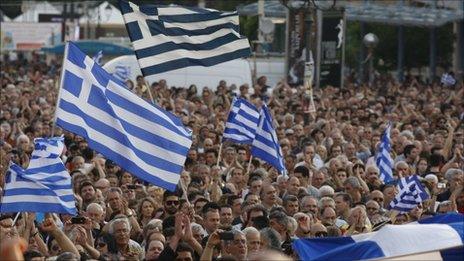Greece: Watch Syntagma Square's green dots and worry
- Published
- comments
Syntagma Square, Athens, 14 June, 9pm: You can't miss the green dancing dots; laser lights playing across the face of the Hotel Grand Bretagne on Syntagma Square as dusk falls, and the crowd chanting: "Underneath! Underneath!"
The chant refers to the subterranean bolthole they believe connects the five-star hotel to the Greek parliament, which they would like the government to use. The green dots - well, they are there to destroy the video cameras of the TV networks that have been stationed there since 25 May, when thousands of Greek youth took this square, and many other squares across the country, in protest at the austerity plan.
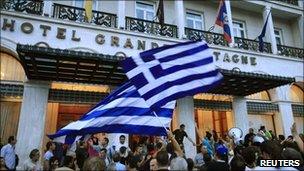
Some believe the Hotel Grand Bretagne is connected to the Greek parliament by a secret underground passage
"All media in Greece is corporately owned: people here believe it's aligned to the very same forces that have ripped off the country so there is total hostility to them," explains Antonis, a student, who is guiding me around the square, as we shield our camera and eyes from the roving green dots.
In one corner there is a political "pre-meet" - about 100 people in an earnest circle discussing, as Antonis puts it, "the 50 answers you will get if you ask 50 people here what they want".
By the railings of parliament are the nationalists with their blue-white flags and next to them an orange banner depicting a helicopter. This is by way of a subtle message to the government of Prime Minister George Papandreou - an invitation to leave Athens in the same manner as the US military left Hanoi, and soon.
In another corner of the square, under the exquisite ornamental trees, is a campsite where around 400 people have been living for 21 days. Along the centre of the square are various stalls; some organising things; some selling literature or hash pipes; mostly the stalls are just meeting points and the reference point for the banners that have been improvised: "This is a new kind of democracy"; "Dictatorship didn't finish in 1973 but we're gonna finish it today" etc.
What's new about this protest, according to Antonis, is the relatively non-political nature of many of the young people who come down here every night. The main Greek communist party, the KKE, has boycotted it; the further left parliamentary party Synaspismos has people here, as do the anarchists - but apart from that it is non-political. The ruling Greek socialist party, PASOK, is of course not present and the nationalists seem to have puzzled everyone by turning up and being the loudest voices (for tonight at least).
"It's regime change," says Antonis: Whatever happens in parliament, whatever happens with the new austerity budget due to be introduced on 15 June, whatever happens on the streets, he thinks the rash of camps in Greek town squares signals a big switch-off from traditional politics.
"Already, even on day one, you heard people saying we can't go back to how it was before," he says.
The demonstrators here plan to blockade the Greek parliament on Wednesday; later in the day the trade unions, who have called a general strike, will march to join them. They're aiming to force individual socialist MPs from the ruling party to break off and oppose or abstain on the austerity measures, which are demanded by the EU as the condition for the bailout that is dominating the pages of financial papers (and the lives of economics journalists).
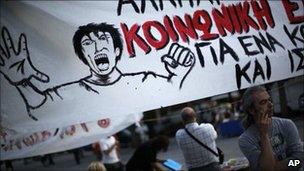
Demonstrators plan to blockade the Greek parliament on Wednesday, as unions observe a general strike
But while we're all obsessed with the details of the haircut versus roll-over debate, the ECB versus the IMF etc, tens of thousands of Greek young people are entering - if not politics, then a kind of anti-politics. They have just switched off from the mainstream process - politics, media, etc. Hence the unchallenged laser sabotage of the TV coverage.
At 9pm they sit down, cross-legged on the stones of Syntagma and have a polite, quiet, mass meeting. They are beyond the rhetoric stage: It's about the precise tactics and problems of being an unled mass movement in the post-ideological age.
Seeing this up-close for the first time, I am struck by its similarity to Glastonbury and dissimilarity to, say, a big trade union march. Southern Europe's youth are - in some numbers, even if not in a majority - shifting downwards through the gears of disengagement with the political mainstream towards a sullen, highly educated anger that could go in many directions.
Europe's finance ministers, assembled tonight to bash out their differences over the near-inevitable Greek default (there are many flavours) would do well to contemplate those green dots of laser light and their implicit message, which is: We don't even want to be on your TV screens; indeed we would rather bust your cameras than accept your austerity.
It will be interesting to see how this interacts with Greek middle-class public opinion. The centre-right opposition party New Democracy is now riding high in opinion polls - though with 37% would not win an election outright, as its Portuguese counterpart did: If there's a snap election I would expect the same outcome as in Portugal, and as in Spain - where the existence of a square's occupation movement belied a national-level electoral swing to the right.
When I put it to the protesters that this might happen their attitude was: We don't care. New Democracy will come in, and they will soon go out again. They saw little difference between the parties, given effective economic sovereignty lies in Brussels.
For now that's just a snapshot. More tomorrow.
- Published13 June 2011
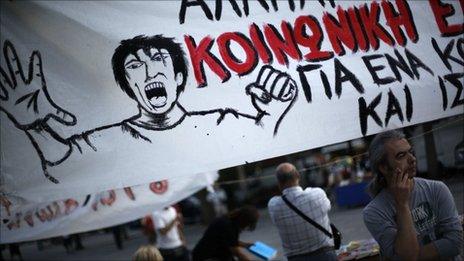
- Published3 June 2011
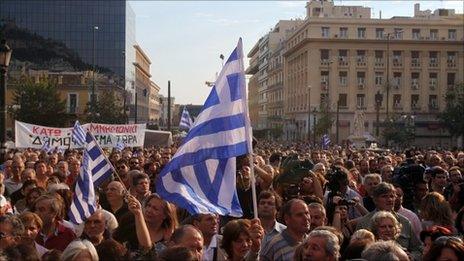
- Published2 June 2011
